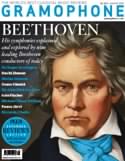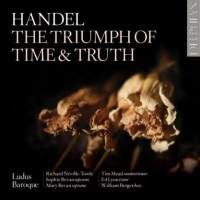Texte paru dans: / Appeared in:
*

GRAMOPHONE (08/2014)
Pour s'abonner /
Subscription information
Delphian
DCD34135

Code-barres / Barcode : 0801918341359
Reviewer: David Vickers
It is misleading to rank The Triumph of Time and Truth (1757) as Handel’s last English oratorio. Unlike Jephtha (1752), it was not his own fresh work but an anglicised (and de-Catholicised) adaptation of his very first Roman oratorio Il trionfo del Tempo e del Disinganno (1707), prepared by librettist Thomas Morrell working in collaboration with John Christopher Smith junior (Handel’s pupil, assistant and heir), but based on Handel’s own extensive London revision (1737). Handel’s only direct involvement was likely to have been limited to offering approving consent (or otherwise). None of this fundamental stuff is explained in Delphian’s booklet essay; nor does it report that Richard NevilleTowle presents the complete content of Handel/Smith’s 1758 revival (for which the role of Deceit was expanded).
The small orchestra’s playing is stylish and characterful, and Delphian’s excellent sound engineering fosters a perfect bloom for splendid trumpets and choral exclamations in the opening chorus, ‘Time is supreme’. The choir is ideally convivial, shapely of phrase and immaculate with text in the delightful chorus ‘Pleasure submits to pain’ that commences Act 2. Tim Mead sings serenely in Counsel’s ‘Mortals think that Time is sleeping’, a 1707 aria that retains its pair of cathartic recorders. Ed Lyon’s cheerful evocation of pastoral romps in Pleasure’s ‘Dryads, Sylvans, with fair Flora’ makes sin seem seductively plausible, whereas William Berger sings the solemn warnings of Time with compassionate authority: ‘Loathsome urns, disclose your treasure’ is subtly characterised by whispering strings and cautionary bassoon. It is intriguing to hear how Smith rewrote Agrippina’s flirtatious ‘Ogni vento’ for the seductive siren
Deceit’s
‘Happy Beauty, who, Fortune now smiling’, finding attractive ways to use oboes,
bassoons and a pair of horns that support the blithe Mary Bevan on fine form.
Sophie Bevan matches her distinguished predecessor Gillian Fisher (Darlow,
Hyperion) stride for stride; her eventual choice of Christian virtue over
sensual decadence is expressed eloquently. Ludus Baroque’s most valuable Handel
recording so far confirms that this unclassifiable, peculiar work is well worth
revisiting.
Fermer la fenêtre/Close window
Cliquez l'un ou l'autre
bouton pour découvrir bien d'autres critiques de CD
Click either button for many other reviews


